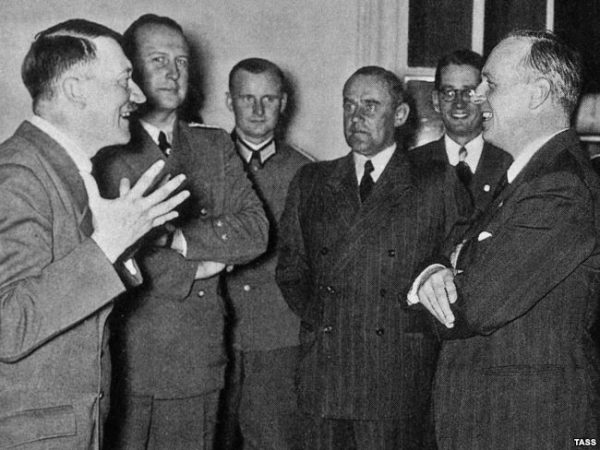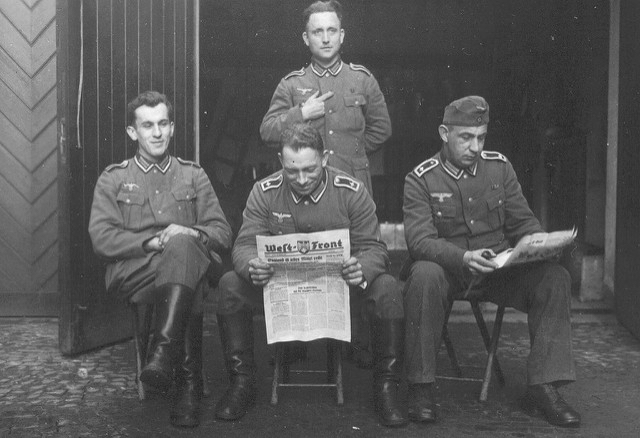In December 1938 the Defendant Ribbentrop, in a conversation with M. Bonnet, who was then Foreign Minister of France, expressed his opinion of the Jews. That was reported by the United States Ambassador, Mr. Kennedy, to the State Department.
The report of Mr. Kennedy is Document L-205, which I now put in as Exhibit GB-157. If I might read to the Tribunal the second paragraph, which concerns this point:
“During the day we had a telephone call from Berenger’s office in Paris. We were told that the matter of refugees had been raised by Bonnet in his conversation with Von Ribbentrop. The result was very bad. Ribbentrop, when pressed, had said to Bonnet that the Jews in Germany, without exception, were pickpockets, murderers, and thieves.
The property they possessed had been acquired illegally. The German government had therefore decided to assimilate them with the criminal elements of the population. The property which they had acquired illegally would be taken from them. They would be forced to live in districts frequented by the criminal classes. They would be under police observation like other criminals. They would be forced to report to the police as other criminals were obliged to do.
The German government could not help it if some of these criminals escaped to other countries which seemed so anxious to have them. It was not, however, willing for them to take the property which had resulted from illegal operations with them. There was in fact nothing that it could or would do.”
That succinct statement of this defendant’s views on Jews is elaborated in a long document which he had sent out by the Foreign Office, which is numbered 3358-PS, which I put in as Exhibit GB-158. I do not want to read the whole of that document because it is excessively dreary; it is also an excessively clear indication of the defendant’s views on the treatment of Jews. But if the Tribunal would look at, first of all, Page 3—it is headed, “The Jewish Question as a Factor in German Foreign Policy in the Year 1938”; after the four divisions the document goes on to say:
“It is certainly no coincidence that the fateful year 1938 has brought nearer the solution of the Jewish question simultaneously with the realization of the ‘idea of Greater Germany,’ since the Jewish policy was both the basis and consequence of the events of the year 1938.”
That is elaborated. If the Tribunal will turn over to Page 4 at the beginning of the second paragraph, they will see the first sentence:
“The final goal of German Jewish policy is the emigration of all the Jews living in Reich territory.”
Then that is developed at great length through a large number of pages. The conclusion which is—if the Tribunal would turn to the foot of Page 7 and examine it—it goes on this way:
“These examples from reports from authorities abroad can, if desired, be amplified. They confirm the correctness of the expectation that criticism of the measures for excluding Jews from German Lebensraum, which were misunderstood in many countries for lack of evidence, would be only temporary and would swing in the other direction the moment the population saw with its own eyes and thus learned what the Jewish danger was to them.
The poorer and therefore the more burdensome the immigrant Jew is to the country absorbing him, the stronger this country will react and the more desirable is this effect in the interest of German propaganda. The object of this German action is to be a future international solution of the Jewish question, dictated not by false compassion for the ‘United Religious Jewish Minority’ but by the full consciousness of all peoples of the danger which it represents to the racial composition of the nations.”
The Tribunal will appreciate that this document was circulated by the defendant’s ministry, widely circulated to all senior Reich authorities and to numerous people before the war, on the 25th of January 1939, just after the statement to M. Bonnet. Apparently the anti-Semitism of the defendant went from—I was going to say from strength to strength, if that is the correct term, or at any rate from exaggeration to exaggeration, for in June 1944 the Defendant Rosenberg made arrangements for an international anti-Jewish congress to be held in Kraków on the 11th of July 1944.
The honorary members were to be Von Ribbentrop, Himmler, Goebbels, and Frank—I think the Defendant Frank. The Foreign Office was to take over the mission of inviting prominent foreigners from Italy, France, Hungary, Holland, Arabia, Iraq, Norway, et cetera, in order to give an international aspect to the congress. However, the military events of June 1944 prompted Hitler to call off the congress which had lost its significance by virtue of the landings in Normandy.
That is contained in Document 1752-PS, GB-159. At the foot of Page 1 the Tribunal will see the following had been entered as honorary members: Reich Foreign Minister Joachim von Ribbentrop. So that there is no doubt that this defendant was behind the program against the Jews which resulted in the placing of them in concentration camps with anyone else who opposed the Nazi way of life; and it is submitted that he must, as a minister in special touch with the head of the government, have known what was going on in the country and in the camps. One who preached this doctrine and was in a position of authority cannot, I submit to anyone who has had any ministerial experience, suggest that he was ignorant of how the policy was carried out.
Adapted from Trial of the Major War Criminals Before the International Military Tribunal (1946). Photograph courtesy of TASS. All rights reserved.





